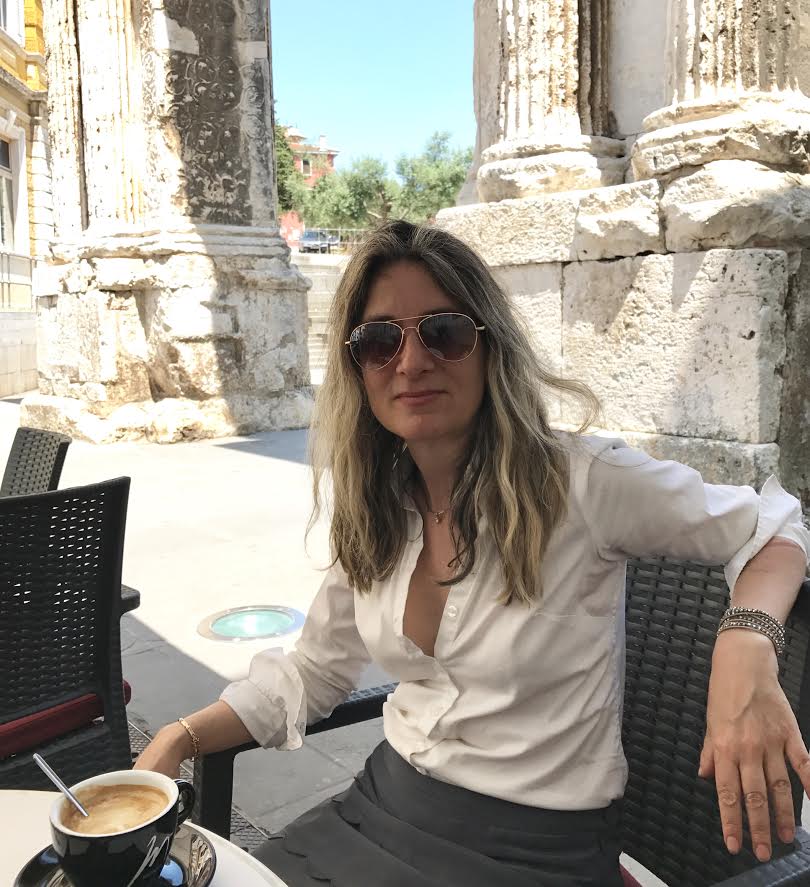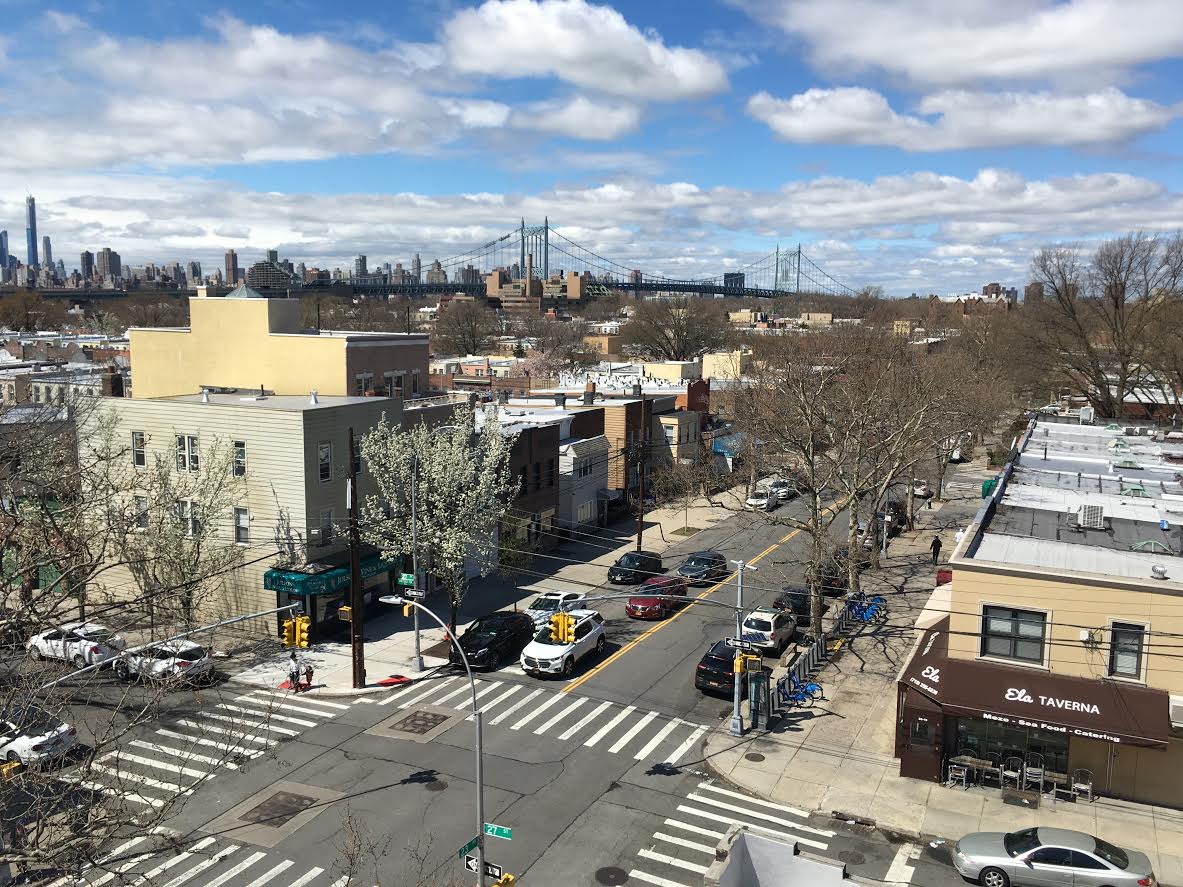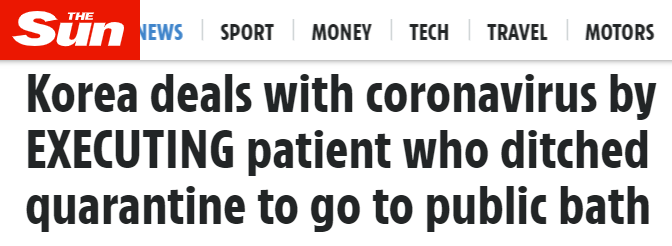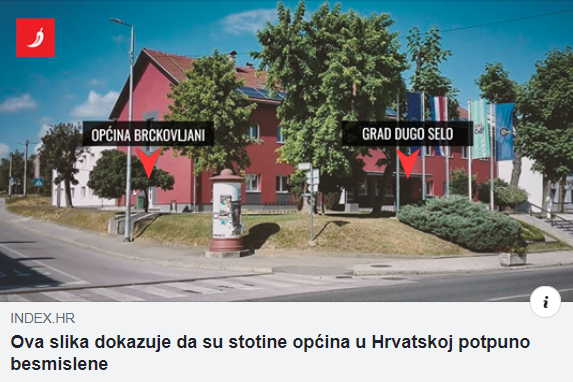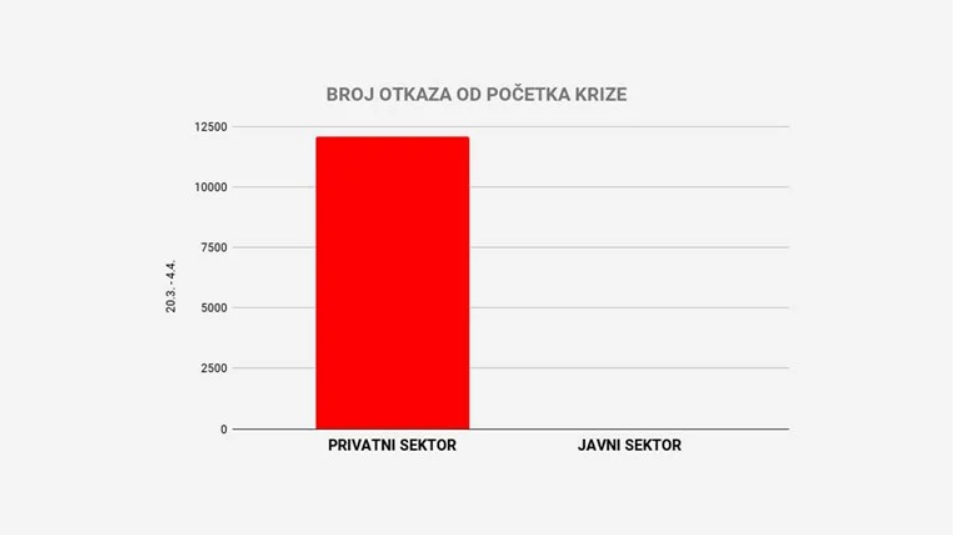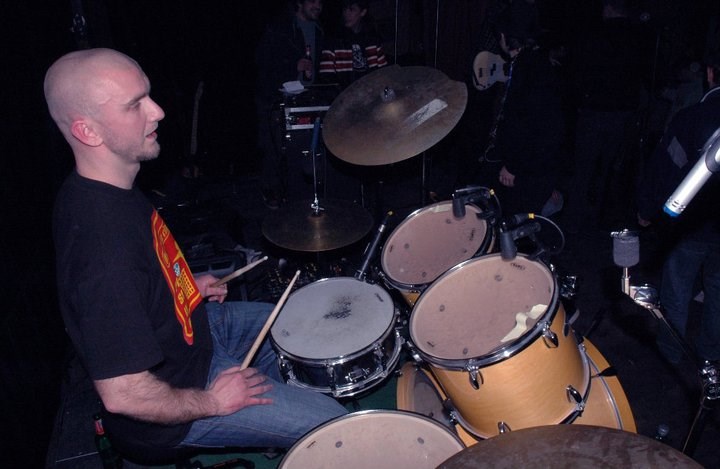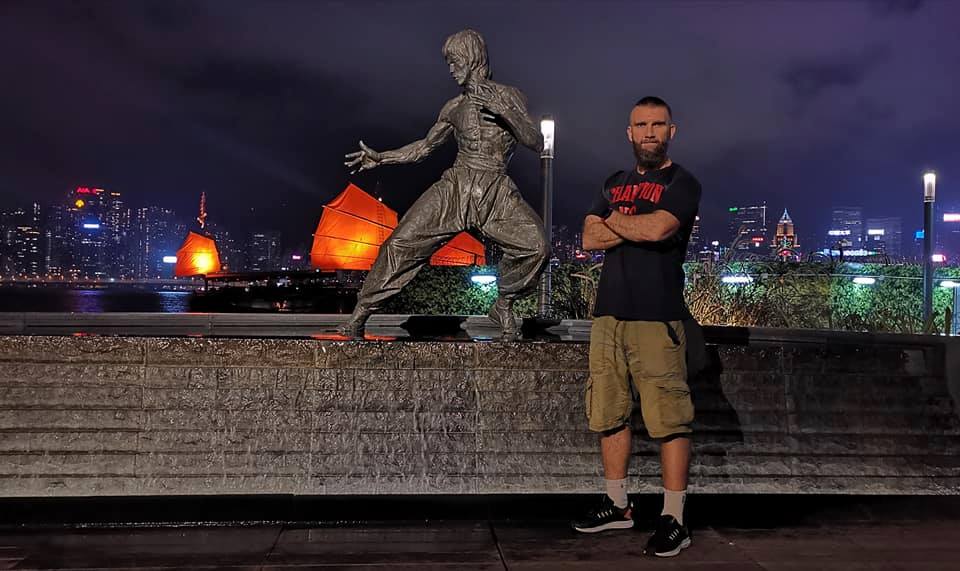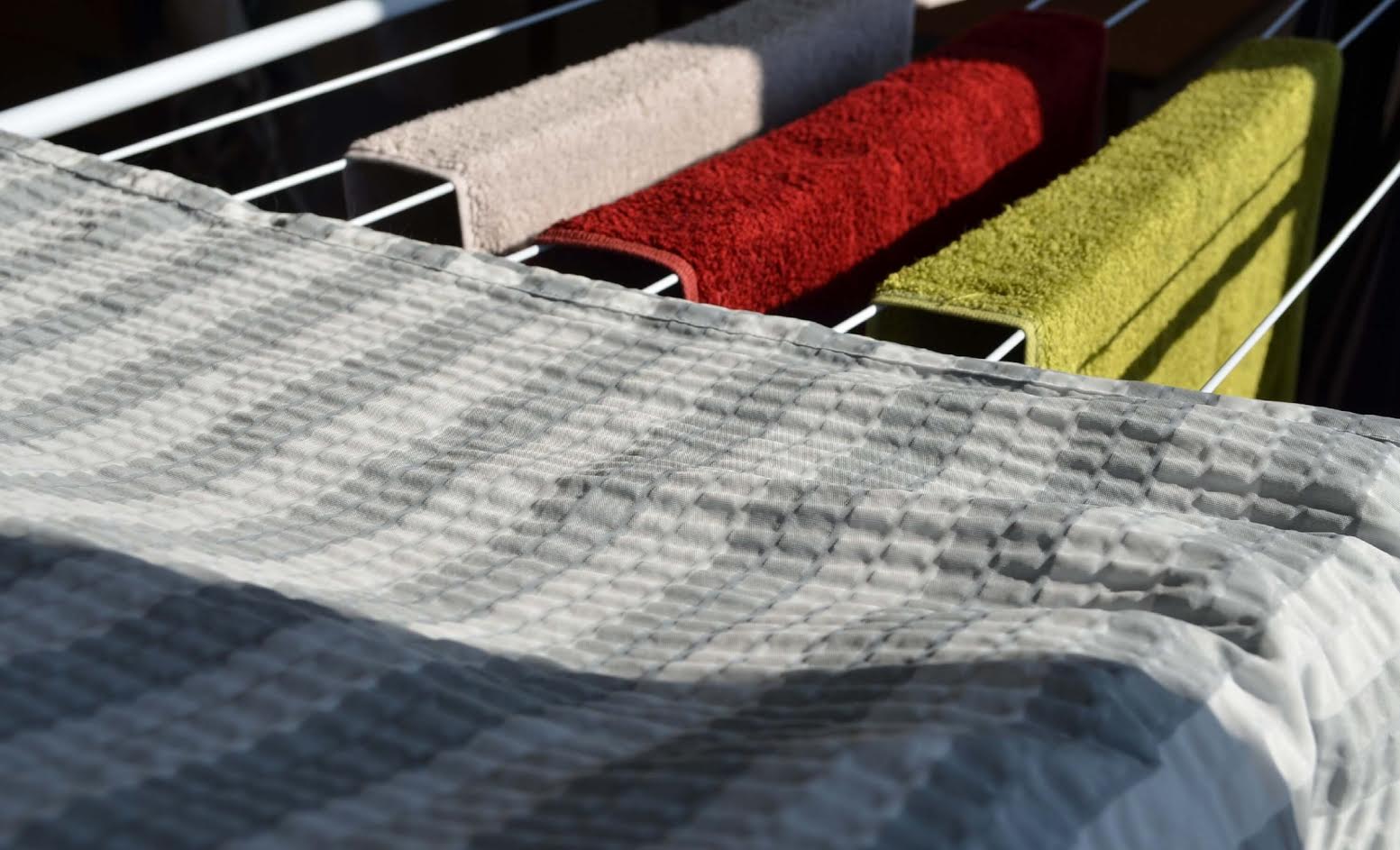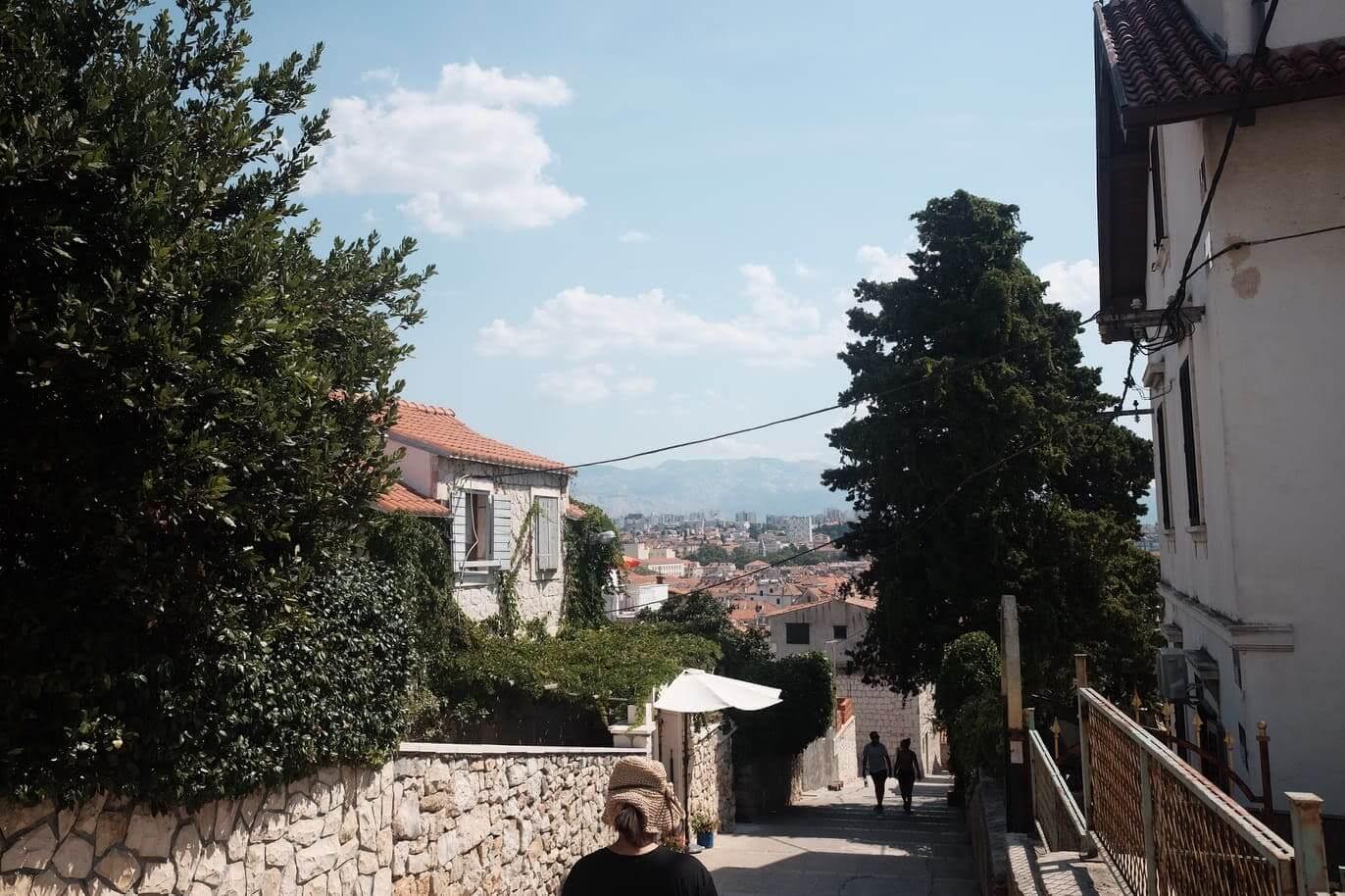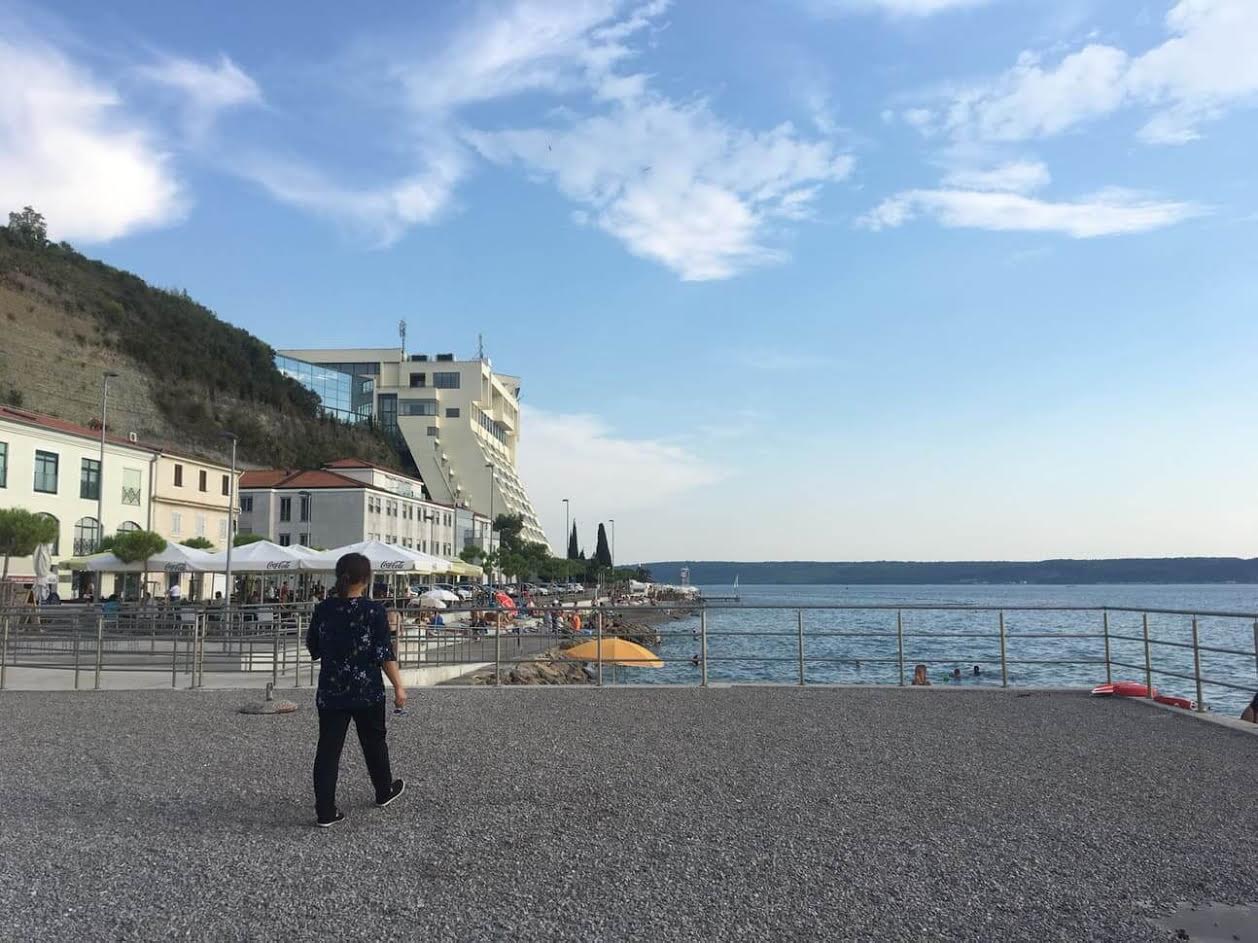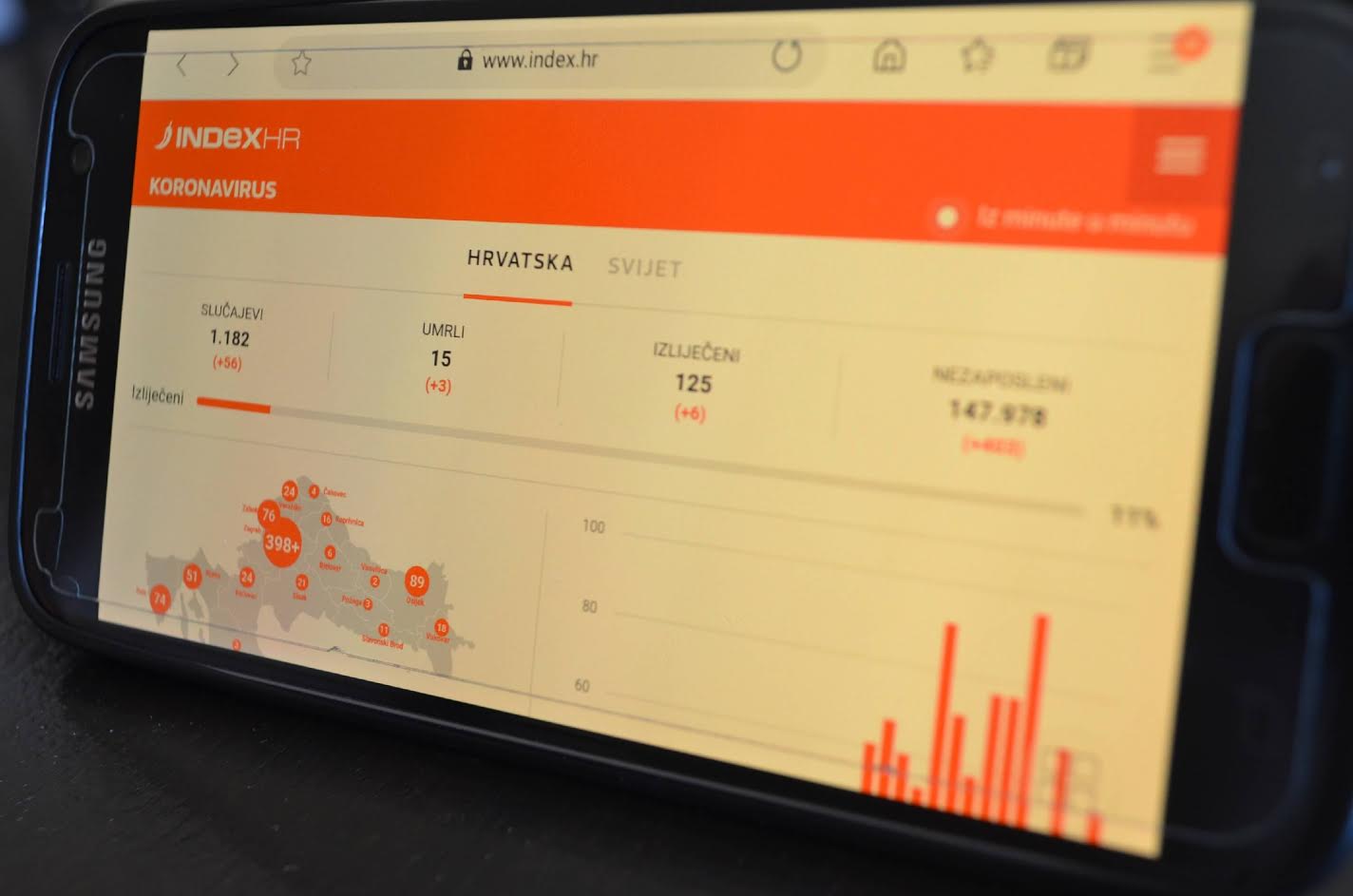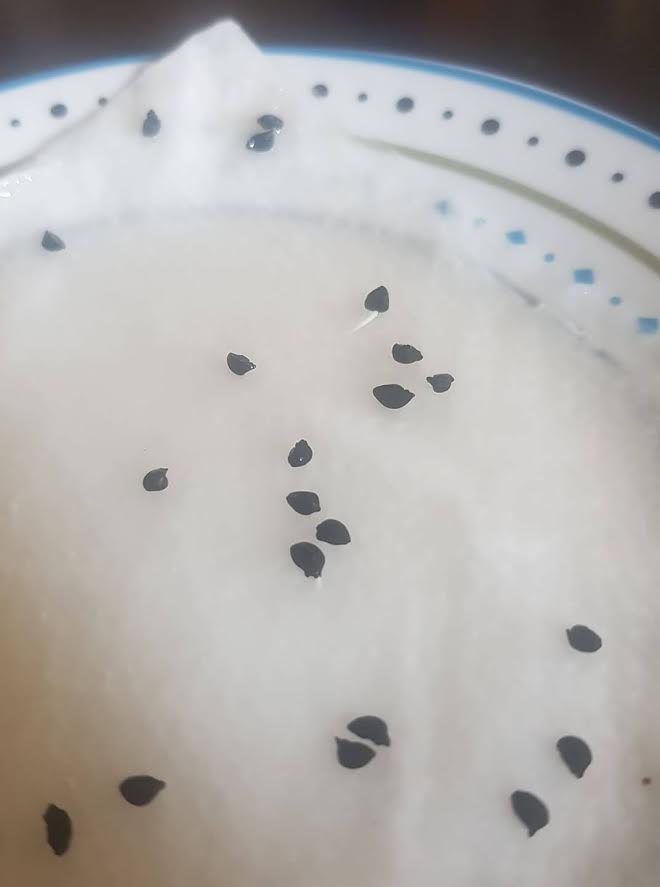Defence Minister Stresses Importance of Information Sharing Amid Coronavirus Crisis
ZAGREB, April 6, 2020 - Defence Minister Damir Krstičević on Monday stressed the importance of information sharing in safeguarding public health in Croatia and the European Union. "We will share national experiences in providing support to civilian institutions, with emphasis on further strengthening cooperation and solidarity among the EU member states," Krstičević told the press in Zagreb ahead of a video conference of EU defence ministers, the first such conference on efforts aimed at containing the coronavirus pandemic.
The emergency meeting will be chaired by EU High Representative for Foreign Affairs and Security Policy Josep Borrell.
Krstičević said that the meeting was important because of sharing experience and information. "As we can see, we need to adapt and do our best to safeguard the health of our citizens in Croatia and in the EU," he added.
He underscored Croatia's prompt response to the coronavirus outbreak, including measures aimed at "healthcare, safety, education and the economy."
Krstičević said that the Croatian military had played an important role in assisting the healthcare system, citing the erection of tents for patients outside the Dubrava hospital in Zagreb.
He said that he would inform his EU counterparts of the strong earthquake that had struck Zagreb on March 22, which made the fight against the coronavirus more difficult.
"We had two crisis situations at the same time, and the Croatian army, as part of the homeland security system, responded to the earthquake in a timely fashion as well," Krstičević said.
More coronavirus news can be found in the Lifestyle section.
Corona Voices in the Croatian Diaspora: Aleksandar in New York City
April 6, 2020 - With as many Croatians living abroad as in the Homeland, what are the diaspora experiences of self-isolation? In the fourth of a new series, Corona Voices in the Croatian Diaspora, here is Aleksandar Bulajic from New York City.
Last week TCN started a feature series called Foreigner Self-Isolation In Croatia: Do You Feel Safer? I can honestly say we have never had such a response or so many incredible contributions. The countries of origin of these expats in Croatia literally from all over the world. So far we have had submissions from expats from Romania, USA, Ireland, UK, Mexico, Argentina, Spain, Singapore, Holland, Canada, India, Hong Kong, Venezuela, Latvia, China, Honduras, Hungary, Moldova, New Zealand and Germany. You can see all their stories here.
Given the success of the series (still going strong) and large interest, it made sense to expand it to look at this from another angle - how Croatians abroad are coping where they are. If you would like to contribute your story to Corona Voices in the Croatian Diaspora, please find the submission guidelines below. And now, the view the centre of the pandemic currently - New York City. We are very grateful to New York resident Aleksandar Bulajic for this account of his current reality and view of Croatia.
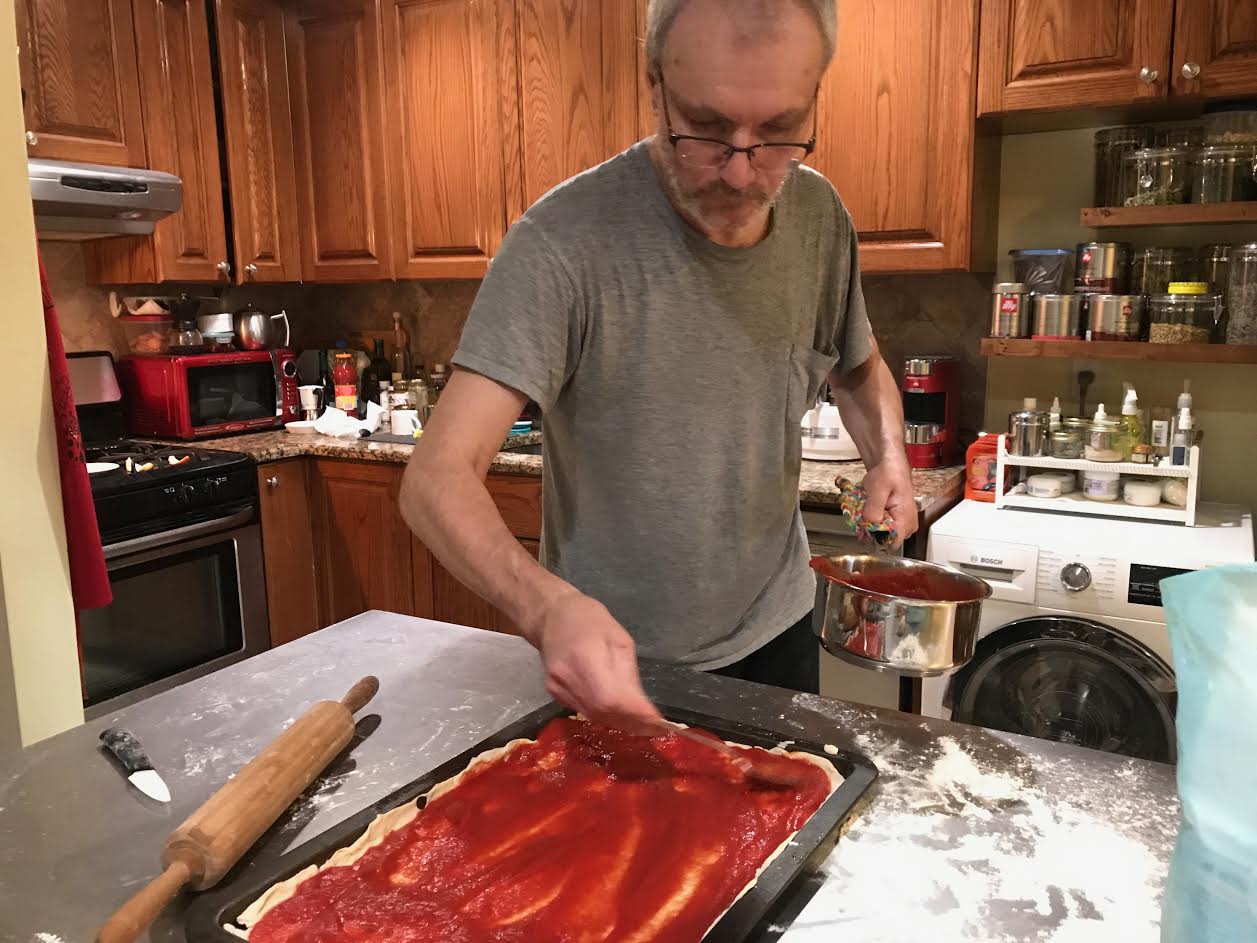
Firstly, how are you? Are you alone/with someone? Tell us a little about your situation and sanity levels.
I’m living with my partner DJ, she’s American, along with our two cats, Jožek and Arlo. My teenage son Luka lives in Columbus, Ohio, with his mom. Luka and I would typically see each other once a month, at least until now. All-in-all, we’re doing, ‘knock-on-wood’, well. Monday, April 6, 2020 marks the start of our fourth week in self-isolation.
Like many others in the restaurant business, I lost my job when our restaurant closed its doors. Delmonico’s first opened in 1837 - and as a cultural institution and barometer of NYC health, we’re hoping it and other businesses open soon again.
Thankfully, DJ is still working full-time. She’s an architectural and graphic designer with the international firm Rockwell Group. It took some adjusting for us to be working from home, though so far we’re handling this unprecedented situation fairly well.
When did you realize that coronavirus was going to be a big issue?
When Italy started falling apart — it was I think in the first week of March, when the number of deaths started going up like crazy — that I realized the coronavirus was going hit the US and the world like a tsunami.
When did you realize that coronavirus was going to be a big issue in New York in particular?
When prominent restaurants (like Le Bernardin) and restaurateurs (Danny Meyer, Eric Ripert) began closing their doors, which happened in the first half of March, is when it struck me that this would hit NYC hard. It was like a point of no return. And, in just a matter of days, one of the most populated cities in the world was abruptly a ghost town. To me, it seemed inevitable; there’s no way we can keep such a dense and bustling city as New York out of this pandemic.
Give us a timeline on when and how life changed.
March 16, the day when Delmonico’s ceased operations and I lost my job of seven years. DJ’s office had also started a work-from-home policy on that day. Only days prior, it was merely a discretionary policy, but within two days became part of mandatory office closings throughout New York City.
Tell us about your day. Do you/can you leave your apartment?
Day-to-day, we can leave our apartment, but we try not to unless absolutely necessary. We typically order groceries for delivery, though that is becoming difficult as less people are available to do that job, and shelves are lacking basic goods. Typically when we place an order for groceries, the expected delivery is in three weeks. A small, family-owned grocery store across the street from our apartment has recently closed, and is no longer an option for staples such as toilet paper or milk. If we must go outside, it’s with masks, gloves, and a hat to cover our hair.
Any delivered groceries or packages from outside go through a thorough routine involving both DJ and I to ensure the virus doesn’t enter the apartment.
Living in a NYC apartment building is also a bit tricky in the age of coronavirus. We attempt to avoid neighbors as much as possible — for both our safety and theirs, as the hallways are narrow and shared doorknobs not cleaned since mid-March.
On the brighter side, I’m cooking as never before. Yes, I’m definitely stress baking, though I’m grateful to have small pleasures at this time. And luckily we have a modest backyard that allows for some fresh air, table tennis, and soccer ball practice.
How are the authorities doing at handling the situation?
We are really grateful for having Andrew Cuomo as our Governor. His daily press briefings are delivered with direct honesty and leadership. We truly feel he is fighting for New York State. He’s direct, eloquent, calm, and most importantly, Cuomo is well-informed. He also knows to surround himself with professionals that can address the myriad aspects of how a city is - or may be - affected by this pandemic.
I wish I can say the same for the President of the United States who, by his inaction, is responsible for the exponential spread of this deadly virus that has and will cost numerous lives.
You obviously keep an eye on your homeland. What is your impression of the way Croatia is dealing with the crisis?
Kudos to the government of Croatia, both federal and local. Kudos to everyone in my homeland who is doing a great job with self-distancing, self-isolating, and taking this horror seriously. The right leadership in the right place at the right, critical time. Yes, I’m biased, though it looks like my county Istria — which is the closest one to Italy — is doing a great job.
Compare and contrast the responses of Croatia and USA. Who is doing what better?
Croatia is doing a much better job in fighting this disease than the US, mostly because our federal government has failed in acting on time to curtail this pandemic.
What about official communications from the authorities, compared to your home country?
The daily press conferences by the New York Governor, Andrew Cuomo, are strait-forward, concise, and delivered with knowledgeable leadership. It’s no small wonder that many are asking him to run for the Presidency of the US.
What's the one thing you wish you had taken with you into self-isolation?
More beer for sure. It’s sometimes the small pleasures that make isolation a bit easier.
One thing you have learned about yourself, and one thing you have learned about others during this crisis.
I used to be a full-time journalist, starting in 1997 with Glas Istre, a Croatian daily newspaper. As my late ex-boss Željko Žmak once said to me, “when you got ink under your nails, there’s no way you can get rid of it”. That’s absolutely true. One thing that has shifted is my daily need, and time to write again. I’ve focused on my website Croatian In New York http://croatian-in-new-york.
If you could be self-isolating in Croatia, where would it be, and why?
There’s only one place where self-isolation would be a gift and not punishment: the Island Unije. Back in 2015 DJ, Luka and I spent the most incredible 14 days of our life there. I believe that time spent on islands has a powerful effect on relaxing the mind and body, compared to time spent on a continent. I’m talking about small, tiny islands where one is completely surrounded by the sea. Time slows on islands, where one day of vacation on the island feels like two on the continent.
Thanks, Aleksandar. Stay safe and see you on the other side. You can see all the stories in both this diaspora series, and the one on expats in Croatia on this link.
TCN is starting a new feature series on Croatian diaspora experiences of sitting out COVID-19 abroad and comparing your experiences to the situation in Croatia. If you would like to contribute, the questions are below. Please also include a para about yourself and where you are from, and a link to your website if you would like. Please also send 3-4 photos minimum to This email address is being protected from spambots. You need JavaScript enabled to view it. Subject Corona Diaspora
If you would be interested to record a video version for our partners www.rplus.video please let us know in the email. Thanks and stay safe.
Self-Isolation Voices from the Diaspora
Firstly, how are you? Are you alone/with someone? Tell us a little about your situation and sanity levels.
When did you realise that corona was going to be a big issue?
When did you realise that corona was going to be a big issue in New York in particular?
Give us a timeline on when and how life changed.
Tell us about your day. Do you/can you leave your apartment?
How are the authorities doing at handling the situation?
You obviously keep an eye on your homeland. What is your impression of the way Croatia is dealing with the crisis?
Compare and contrast the responses of Croatia and USA. Who is doing what better?
What about official communications from the authorities, compared to your home country?
What's the one thing you wish you had taken with you into self-isolation?
One thing you have learned about yourself, and one thing you have learned about others during this crisis.
If you could be self-isolating in Croatia, where would it be, and why?
TCN has recently become a partner in Robert Tomic Zuber's new R+ video channel, initially telling stories about corona experiences. You can see the first TCN contribution from this morning, my video from Jelsa talking about the realities of running a news portal in the corona era below. If you would like to also submit a video interview, please find Robert's guidelines below
VIDEO RECORDING GUIDE
The video footage should be recorded so that the cell phone is turned horizontally (landscape mode).
There are several rules for television and video news:- length is not a virtue- a picture speaks more than a thousand words
In short, this would mean that your story should not last more than 90 seconds and that everything you say in the report should be shown by video (for example, if you talk about empty streets, we should see those empty streets, etc.).
How to do it with your cell phone? First, use a selfie camera to record yourself telling your story for about a minute and a half. Ideally, it would be taken in the exterior, except in situations where you are reporting on things in the interior (quarantine, hospital, self-isolation, etc.). Also, when shooting, move freely, make sure everything is not static.
After you have recorded your report, you should capture footage that will tell your story with a picture, such as an earlier example with empty streets.
One of the basic rules of TV journalism is that the story is told in the same way as a journalist with his text. Therefore, we ask you for additional effort. Because we work in a very specific situation, sometimes you may not be able to capture footage for each sentence of the report. In this case, record the details on the streets: people walking, the main features of the city where you live, inscriptions on the windows related to the virus, etc.
The same rules apply if you are shooting a story from your apartment, self-isolation, quarantine. We also need you to capture footage that describes your story.
When shooting frames to cover your reports, it is important that you change the angle of the shot (in other words, shoot that empty street from several angles). Also, when shooting a detail, count at least five seconds before removing the camera to another detail.
The material should be about 5 minutes long (90 seconds of your report + frames to cover your story).
After recording everything, send us to Zagreb, preferably via WeTransfer to This email address is being protected from spambots. You need JavaScript enabled to view it.
North Korea and Uhljebistan: the Only Coronavirus-Proof States in the World?
April 6, 2020 - What do North Korea and the mighty State of Uhljebistan in Croatia have in common in the Corona Era?
(Disclaimer: in these unusual times, it should be pointed out that this is a satirical piece about the mythical - but sadly real - State of Uhljebistan in Croatia. There is no suggestion coronavirus does not have the same effect in North Korea as elsewhere. It should also be noted that Croatia is doing an excellent job battling COVID-19.)
I have lost count of the number of times I have heard or read the phrases 'things will never be the same again' or 'the world has changed forever' in the last month.
And, if we look around at all the horror of the deadly pandemic, the economic screeching to a halt and - not much talked about yet, but it will possibly be the biggest effect of all - the mental health crisis which is already unfolding in its early stages, it is not hard to agree completely with those statements.
But is it true everywhere in the world?
There is - as always - plenty of speculation of the situation in North Korea, for example, which has not shared any information on the effects of the pandemic there.
In these days of dark humour, the situation in North Korea has led to plenty of memes and other funny images to circulate around the web.
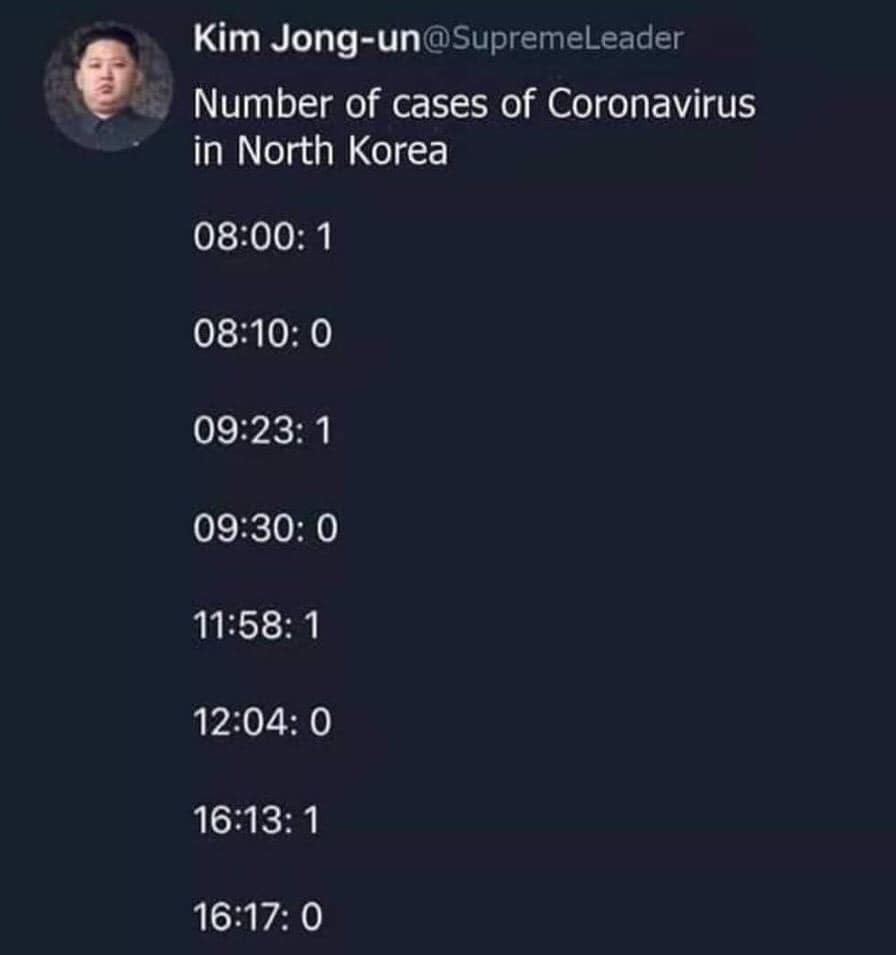
Such as this one, for example, which had a mythical Kim reporting on the daily corona count.
This was sent to be by a friend, and I replied by saying that while it was funny, there might even be an element of truth in it - at least if you believe everything you read in Britain's largest tabloid, The Sun.
Judge for yourself - here is the original article in The Sun.
But there is one mythical state closer to home which is seemingly impervious to the economic chaos brought on by corona - the Mighty State of Uhlebistan, the state within a state in Croatia, whose trademarks are cronyism, corruption and a bloated public administration. You can learn more about the Mighty State of Uljebistan in this foreign appreciation of this very Croatian way of life.
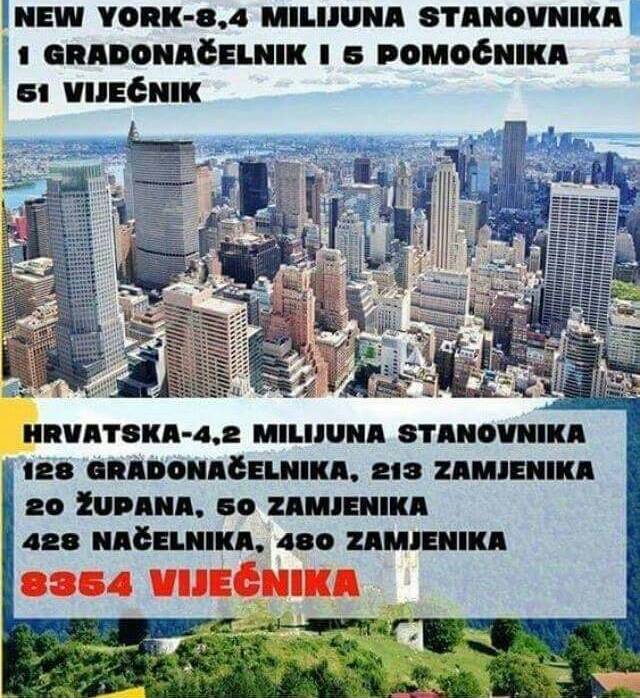
The numbers may not be entirely accurate on this comparison between Croatia and New York (more than 200,000 Croats have emigrated since it hit the web, for example), but it paints a picture.
New York City - population 8.4 million. One mayor, 5 deputies, 51 city councillors.
Croatia - population 4.2 million. 128 city mayors, 123 deputies, 20 county prefects, 50 deputies, 428 town/village mayors, 480 deputies. Total public officials - 8,354.
Index journalist Marko Repecki took a closer look at today's reality in this article (Google Translate is your friend) but perhaps the lead photo says enough - one building has been divided into two different administrative units in Dugo Selo.
Glas Poduzetnika (Voice of Entrepreneurs), a newly-founded association to give a voice to the private sector, has reported that 93% of its member businesses will not be able to survive more than three months in the current climate. An estimated 300,000 private sector jobs could be lost and, as you can see above from the Index chart, almost 12,500 jobs had already been lost by the end of the week.
And in the public sector, the playground of the Mighty State of Uhljebistan (Javni Sektor in the chart above)? Not a single job.
The world may be collapsing, with some 6.6 million unemployed in the United States according to recent numbers, for example, but Uhljebistan? It is impervious to crisis, virus-induced or otherwise.
If there is one good thing that could come out of this corona crisis for Croatia, it would be the spreading of the virus of transparency and change in Croatia's corrupt system. Were that to happen, there would be a considerable upside for the country.
Is it likely to happen? Watch this space, but something will have to give when all the private sector and its payment dues to the Mighty State of Uhljebistan disappear.

But then how many thought that North Korea would still be holding out in the Hermit Kingdom?
I used to work in Somalia, and aid workers used to joke that if there was ever a nuclear war, only two things would survive - cockroaches and Somalis (they are a very tough nation of survivors).
But they would need somewhere to live, and the only place still standing in all likelihood would be the Mighty State of Uhljebistan.
For the latest on the coronavirus crisis in Croatia, follow the dedicated TCN section.
Natalia Zielinska on Comparison of Polish and Croatian Economic Crisis Measures
As Poduzetnik writes on the 6th of April, 2020, in this text, a consultant and entrepreneur, otherwise a Polish woman living and working in Croatia, Natalia Zielinska, summarises the coronavirus crisis measures taken by the Polish Government to help the troubled Polish economy. As the situation with these figures is changing and updating very quickly, the situation on April the 4th, 2020 is discussed here.
Otherwise, at 16:00 today, Natalia Zielinska is organising a webinar where participants can get a lot of useful advice regarding assistance measures and Hamag-Bicro working capital loans.
The situation in Poland
In Poland, there are currently more than 3,300 infected people and 65 people have sadly died owing to the coronavirus pandemic. The highest number of infected people, more than 800, are located in Warsaw and the surrounding county.
In response to the global crisis, the Polish Government passed a series of laws called the "Anti-Crisis Shield", which entered into force on April the 1st, 2020. While the first package of coronavirus measures in Croatia focused mostly on medium and large enterprises, the Polish Government took the most care of micro-entrepreneurs and those who are self-employed, but it significantly neglected the needs of larger companies, causing various reactions.
Unlike in the Croatian case, the Poles have created a simple and transparent website with links provided to all of the measures, and a separate telephone information line has been opened for all questions and concerns from interested parties.
A summary of measures adopted in Poland
It must be noted that these measures vary considerably depending on the size of the company.
Taxes and contributions
A write-off of losses from last year. This measure is based on the experience of 2008/2009, when losses in annual self-employment reports increased by PLN 30 billion. In this way, a company currently suffering losses (with revenues 50 percent lower than in 2019) will be able to reduce the profit/income from independent business in 2019 by submitting an annex to their report for this year. However, the reduction may not exceed PLN 5 million.
Contribution write-offs
This measure applies exclusively to micro-enterprises which were established before the 1st of February 2020, and the Polish state has taken over the payment of contributions on their behalf for three months (March, April and May 2020).
This measure is approved without the need to demonstrate any sort of drop in company revenue, and the exemption applies to both business owners and employees. Self-employed persons with an income of up to PLN 15,681 (300 percent of the average salary) who pay contributions for themselves will also be entitled to write-offs. In addition, farmers will be entirely exempt. In Poland, farmers pay contributions under a special type of farmers' social insurance (the so-called KRUZ).
Job protection - a package of measures to co-finance wages and increase working time flexibility
This regards the co-financing of employee salaries in the amount of 50 percent, 70 percent or 90 percent of the minimum gross salary, depending on the decrease in income (by 30, 50 or 80 percent). This comes with obligations regarding keeping staff that fall on the employer.
Similar measures are offered to the self-employed, whose income has decreased owing to the coronavirus crisis. An entrepreneur can get from 4,599 PLN in 3 months, with 50 percent drop in turnover, and up to 8,279 PLN with a decrease of 80 percent.
For self-employed persons who earn an income through work contracts or copyright contracts through various agencies, 80 percent of the minimum wage was offered, but exclusively for entrepreneurs whose income did NOT exceed 300 percent in the previous month.
Employment Protection Fee
The quarterly co-financing of salaries and social security contributions for employees, and for entrepreneurs who are experiencing economic downtime or are entering part-time work due to the outbreak. A business owner who has reduced his working hours due to a decrease in turnover may reduce his employee's working time by 20 percent, but not more than 0.5 full-time. 40 percent of the previous quarter's average salary can then be deducted.
Loans for micro-enterprises in the amount of PLN 5,000 (approx. 1200 euros)
Other important changes made by the Polish package of measures include the additional care allowance for children and the disabled and the elderly for a period of fourteen days.
Among the amendments adopted was a very important provision providing for an exemption from the Public Procurement Law for contracts awarded to regional development funds, as in the case of contracts awarded by the Polish Regional Development Fund.
The measure is diverse and depends mostly on the number of employees and the formal legal relationship between the employee and the employer. In order to facilitate communication, but also to provide better information, a separate website has been set up with subpages for all potential users: entrepreneurs, farmers, employees, as well as non-governmental or cultural organisations.
Due to the strong reaction and great dissatisfaction from business owners, mostly those with more than nine employees, a new assistance package is now under preparation.
Some of the main arguments of Polish employers are:
The need to introduce measures that must be made available immediately, based on the statement, and the need for them to be verified after the coronavirus epidemic has passed
The retroactive recognition of aid, at least as of March the 13th, when the introduction of a quarantine was announced due to the coronavirus epidemic, not from the date of entry into force of the Act.
The involvement of medium and large enterprises in these aid measures.
The providing of funds to entrepreneurs to cover costs and damages related to the fulfillment of obligations imposed by public authorities and headquarters in the fight against coronavirus (such as assistance to JLSs and healthcare institutions).
The need for government funding for sick leave (currently funded by employers for 33 days), especially in case of sick leave due to coronavirus or because of quarantine.
The need to shorten the VAT refund deadline as soon as possible.
The exemption from VAT. In Poland, VAT is paid into a separate account if it is being paid immediately.
The need for the suspension of current tax audits and the cancellation of new tax audits.
The removal of work restrictions on Sundays (for easier access to required products and also for difficult business-to-business situations).
The need to increase Poland's budget deficit.
Corona Voices in the Croatian Diaspora: Goran Krolo in Guangzhou, China
April 6, 2020 - With as many Croatians living abroad as in the Homeland, what are the diaspora experiences of self-isolation? In the second of a new series, Corona Voices in the Croatian Diaspora, Goran Krolo on the current realities in Guangzhou, Guangdong province, China.
Last week TCN started a feature series called Foreigner Self-Isolation In Croatia: Do You Feel Safer? I can honestly say we have never had such a response or so many incredible contributions. The countries of origin of these expats in Croatia literally from all over the world. So far we have had submissions from expats from Romania, USA, Ireland, UK, Mexico, Argentina, Spain, Singapore, Holland, Canada, India, Hong Kong, Venezuela, Latvia, China, Honduras, Hungary, Moldova, New Zealand and Germany. You can see all their stories here.
Given the success of the series (still going strong) and large interest, it made sense to expand it to look at this from another angle - how Croatians abroad are coping where they are. If you would like to contribute your story to Corona Voices in the Croatian Diaspora, please find the submission guidelines below. And now, the view from China.
Goran Krolo is a physiotheropist and drummer from Vinkovci in Guangzhou, Guangdong province, China, working with a women's' Premier league football club.
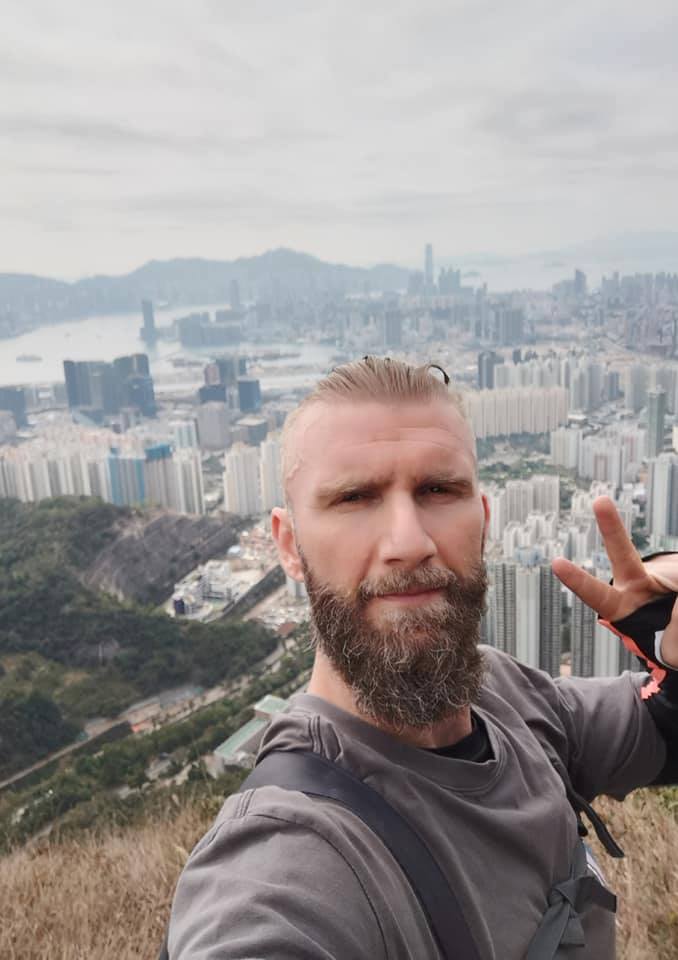
Firstly, how are you? Are you alone/with someone? Tell us a little about your situation and sanity levels.
I am fine but alone in China for two years now. My situation is relatively good as I work in a football base which is pretty much isolated from the rest of the town due to its location so it hasn't been such a critical situation
When did you realise that corona was going to be a big issue?
Guangdong province where I am is the second most affected by Covid-19 in China but that is nothing compared to what has happened in Wuhan. At the end of January, I had a holiday and went to Hong Kong for the Chinese New Year for a week, and there I didn't feel any threat, but when I returned I saw differences that showed me that the situation was very serious, like the railway station in Hong Kong being totally closed after I left. At the railway station, I saw medical staff monitoring the temperature of people arriving, taking swabs and even blood, especially of those who had been in mainland China in the last three weeks. I was forced to be tested.
Arriving back in Guangzhou, which is a huge city of over 13 million, when I came out of the railway station, there wasn't a single person to be seen. I was totally alone like the last survivor of some apocalypse film. I realised then that this was something very serious indeed.
When did you realise that corona was going to be a big issue in your location in particular?
On my return to the Football complex, I noticed that some of the players had not been allowed to return due to health problems. Those who tested negative returned to the base, and from that moment on and up to now, we have been in total lockdown and unable to leave the complex. We from the medical staff are allowed to leave, so it is easier for us and if we do get to leave, masks are absolutely required. You are not allowed in any building without one. At the entrance to any building or transport, people are measured for temperature.
Tell us about your day. Do you/can you leave your apartment?
As I said we can move about but for the first few weeks it was only in the neighbouhood where we lived. There were checkpoints at every area which were manned 24 hours a day and travel between the various suburbs was not permitted at all. This has been relaxed somewhat now.
At first, most shops were closed and we were not allowed to move around the streets or we would be forced to return home. Now most shops are open again and I am even able to visit restaurants once more. Prior to that those restaurants that were still working only allowed delivery.I am still doing my job but with stricter sanitary control.
How are the authorities doing at handling the situation?
China is an authoritarian state and what the authorities say, the people comply. In Wuhan, the citizens were physically locked in their homes and one person was allowed out each week to buy supplies. Elsewhere private citizens organised neighbourhood watches to control the population.
You obviously keep an eye on your homeland. What is your impression of the way Croatia is dealing with the crisis?
Regarding the situation at home, which seems to be good, but I think that it is more due to good luck than the fruit of good organization. People should follow the instructions given them by the authorities, it has worked for China.
Compare and contrast the responses of Croatia and where you are. Who is doing what better?
You cannot compare China with Croatia. In Croatia, the people are given strong advisories, but in Chima, if you do not follow the restrictions, you go to jail.
One thing you have learned about yourself, and one thing you have learned about others during this crisis.
I am not in self-isolation because of this virus, I have been in self-isolation here for two years, and I recommend that everyone should try it, as you find out a lot about yourself in the process. I have books, music and the internet, that's it.
If you could be self-isolating in Croatia, where would it be, and why?
I would lock myself away with a nice girl and then it could potentially end up being more fun!
Thanks, Goran. Stay safe and see you on the other side. You can see all the stories in both this diaspora series, and the one on expats in Croatia on this link.
TCN is starting a new feature series on Croatian diaspora experiences of sitting out COVID-19 abroad and comparing your experiences to the situation in Croatia. If you would like to contribute, the questions are below. Please also include a para about yourself and where you are from, and a link to your website if you would like. Please also send 3-4 photos minimum to This email address is being protected from spambots. You need JavaScript enabled to view it. Subject Corona Diaspora
If you would be interested to record a video version for our partners www.rplus.video please let us know in the email. Thanks and stay safe.
Self-Isolation Voices from the Diaspora
Firstly, how are you? Are you alone/with someone? Tell us a little about your situation and sanity levels.
When did you realise that corona was going to be a big issue?
When did you realise that corona was going to be a big issue in New York in particular?
Give us a timeline on when and how life changed.
Tell us about your day. Do you/can you leave your apartment?
How are the authorities doing at handling the situation?
You obviously keep an eye on your homeland. What is your impression of the way Croatia is dealing with the crisis?
Compare and contrast the responses of Croatia and USA. Who is doing what better?
What about official communications from the authorities, compared to your home country?
What's the one thing you wish you had taken with you into self-isolation?
One thing you have learned about yourself, and one thing you have learned about others during this crisis.
If you could be self-isolating in Croatia, where would it be, and why?
TCN has recently become a partner in Robert Tomic Zuber's new R+ video channel, initially telling stories about corona experiences. You can see the first TCN contribution from this morning, my video from Jelsa talking about the realities of running a news portal in the corona era below. If you would like to also submit a video interview, please find Robert's guidelines below
VIDEO RECORDING GUIDE
The video footage should be recorded so that the cell phone is turned horizontally (landscape mode).
There are several rules for television and video news:- length is not a virtue- a picture speaks more than a thousand words
In short, this would mean that your story should not last more than 90 seconds and that everything you say in the report should be shown by video (for example, if you talk about empty streets, we should see those empty streets, etc.).
How to do it with your cell phone? First, use a selfie camera to record yourself telling your story for about a minute and a half. Ideally, it would be taken in the exterior, except in situations where you are reporting on things in the interior (quarantine, hospital, self-isolation, etc.). Also, when shooting, move freely, make sure everything is not static.
After you have recorded your report, you should capture footage that will tell your story with a picture, such as an earlier example with empty streets.
One of the basic rules of TV journalism is that the story is told in the same way as a journalist with his text. Therefore, we ask you for additional effort. Because we work in a very specific situation, sometimes you may not be able to capture footage for each sentence of the report. In this case, record the details on the streets: people walking, the main features of the city where you live, inscriptions on the windows related to the virus, etc.
The same rules apply if you are shooting a story from your apartment, self-isolation, quarantine. We also need you to capture footage that describes your story.
When shooting frames to cover your reports, it is important that you change the angle of the shot (in other words, shoot that empty street from several angles). Also, when shooting a detail, count at least five seconds before removing the camera to another detail.
The material should be about 5 minutes long (90 seconds of your report + frames to cover your story).
After recording everything, send us to Zagreb, preferably via WeTransfer to This email address is being protected from spambots. You need JavaScript enabled to view it.
Decision to Reopen Farmers' Markets Possible on Tuesday
ZAGREB, April 6, 2020 - Interior Minister Davor Božinović said on Monday the national civil protection authority could adopt a decision to reopen farmers' markets tomorrow.
"Meetings are under way with local civil protection authorities and associations of towns and municipalities, and when we see which measures have been taken, the decision to open farmers' markets will be made public. I expect it could be already tomorrow," Božinović said, presenting to MPs four bills which extend the validity of identity cards, driver's licences, firearms licences and passports.
Responding to questions from MPs, he said 520,000 e-passes to leave one's place of residence had been issued, and that the linear rise in the number of COVID-19 patients showed that the situation was under control.
Franko Vidović of the opposition Social Democratic Party (SDP) asked why some measures against the disease had not been introduced sooner if the government had a meeting on the novel coronavirus as early as January 9.
"The government and the prime minister were among the first to detect that something was happening in China and then, as well as now, too many things were unknown to say whether it would come to Europe. But the fact is that it was discussed and that this epidemic didn't surprise us as some other states," said Božinović.
Hrvoje Zekanović of the opposition Hrast asked if the plan to track citizens by mobile phone would be scrapped.
Božinović said every option was being considered to reduce the spread of the contagion. "The methods that are being applied can also give results, but everything will depend on how the epidemic develops."
Davor Vlaović of the opposition Peasant Party asked about hunters. The minister said epidemiologists advised against hunting.
Božinović thanked all volunteers helping citizens during the current crisis, including football supporters.
A majority of parliamentary groups endorsed the four bills which extend the validity of personal documents, but the SDP regarded them pointless.
"These bills serve to blow smoke in people's eyes. What's the point of being able to leave the country if you can't return?" said MP Ranko Ostojić.
More coronavirus news can be found in the Lifestyle section.
Lawmakers Appeal to Government to Help Farmers and Socially Vulnerable Groups
ZAGREB, April 6, 2020 - Croatian lawmakers on Monday again appealed to the government to help local agricultural producers and vulnerable social groups affected by the coronavirus crisis.
Mladen Mađer of the Work and Solidarity Party called on the government to urgently arrange a meeting with retail chains and agree purchases of local produce. He also called for urgent reopening of farm produce markets and for greater flexibility in issuing passes so that farmers can work their land.
"We must allow small family farms to sell their produce or otherwise we will destroy the little production that we have," Mađer said.
Tomislav Panenić of the Independent Youth List also appealed to the government to help agricultural producers and small family farms, saying that online sales would not solve their problems. "The Ministry of Agriculture should be more efficient because amending just one law is not enough," he said.
Social Democratic Party (SDP) leader Davor Bernardić recalled that his party had drawn up a third package of 10 measures worth HRK 1.7 billion (€224m) to alleviate the consequences of the crisis for more than a million socially vulnerable people.
"In just several weeks of the crisis 20,000 have been laid off and another 400,000 fear losing their jobs," Bernardic warned.
Bozo Petrov of the Bridge party also proposed measures to protect the socially most vulnerable citizens, those with blocked bank accounts, the unemployed and seasonal workers. He called for a moratorium on loan repayments and enforcement proceedings. "If everyone else is entitled to a break, then they are too," he said.
Hrvoje Zekanović of the Croatian Sovereigntists party said that the successful establishment of the e-pass system had shown that electronic voting could be organised as well. "Now we can see that it can be done very quickly and easily," he said.
Goran Beus Richembergh, speaking on behalf of the Civic Liberal Alliance (GLAS) and Croatian Pensioners' Party (HSU) group, said that the present situation should not be allowed to be used for stigmatising people and spreading hatred, stressing the importance of preserving the democratic institutions.
More coronavirus news can be found in the Lifestyle section.
Foreigners Self-Isolating in Croatia: Do You Feel Safer? Daeun Hong from South Korea in Zagreb
April 6, 2020 - Do foreigners in Croatia feel more or less safe sitting out COVID-19 here than in their home country, and what are their experiences? A new series on TCN, with Daeun Hong from South Korea in Zagreb as our 27th contributor.
Oxford University recently published some research on government responses to coronavirus which showed that Croatia currently has the strictest measures in the world. While inconvenient, this is a good thing in terms of reducing the spread of the virus, and I am certainly not alone in my admiration of the official Croatian handling of this crisis in recent weeks, both in terms of action and communication.
But what do other expats here think? And how does it compare with the response in their home country? Would they rather sit this one out here or there? In the first of a new series on TCN, we will be featuring expats from all over the world to see what their views are on life in corona Croatia rather than back home. So far we have heard from expats in Croatia from Romania, USA, Ireland, UK, Mexico, Argentina, Spain, Singapore, Holland, Canada, India, Hong Kong, Venezuela, Latvia, China, Honduras, Hungary, Moldova and Germany. Next up, Daeun Hong from South Korean in Zagreb.
If you would like to contribute to this series, full details are below. Now, over to Daeun.
Firstly how are you? Are you alone/with someone? Tell us a little about your situation and sanity levels.
Well, it is like it is. Or, maybe not so good. I'm feeling bored since I can't really leave my house. I am missing going outdoors. Also, that earthquake hasn't left a good memory. I have trauma if I can say it that way because I never felt that before. Since then, I don't sleep with my light turned off.
Although I'm living alone, my Croatian and foreign friends often call me to check how I'm doing. I'm glad to have them in such a situation.
When did you realize that corona was going to be a big issue?
To be honest, I didn't realize this would become such a thing, not even when our faculty closed. But when public transport stopped and when I saw police on the street, telling people they should stay inside, that was the moment I realized that the situation is getting more serious from minute to minute.
What is your impression of the way Croatia is dealing with the crisis? How safe do you feel?
At the very beginning of the appearance of Coronavirus, the Croatian government didn't take it so seriously. They even criticized other countries, how they have problems. I think that is the moment when the government should have taken the first steps to prepare the country for the crisis. My opinion is that they should have made preparations sooner.
And about me feeling safe, well, I feel safe because I'm never leaving my house.
Now compare that to your home country and how they are handling it. What is Croatia doing better/worse?
When I compare South Korea and Croatia, it would be better for Croatian people to take this situation more seriously. Although many Croatians are aware of what they should be doing, I feel like Croatia is not ready for such an epidemic. Our (South Korea) government is doing great work, and the whole medical system is impressive. But at the same time, people there are maybe too relaxed. As they are thinking, they are entirely safe.
What about official communications from the authorities, compared to your home country?
I must say I'm pretty satisfied with government communication with people. I think it's great that every few hours, they publish new information through every single media platform. Also, I have noticed they show their care for Croatians abroad. The South Korean Embassy is also doing a great job. Every evening, they send me new information about flights to my country. Like, the schedule of flights, through which countries I can go to Korea, which time, which airplane companies...
What's the one thing you wish you had taken with you into self-isolation.
Well, I have electricity, internet, mobile phone to communicate with my family, I have food... So, I would say I have everything. Then again, my cat, who is now in Korea, would have been lovely company during these lonely days. And, if I can be 100% honest, I would love to have Korean food around the corner. A whole store, if it is possible. I really miss Korean food.
One thing you have learned about yourself and one thing you have learned about others during this crisis.
In this time of crisis and global epidemic, I realized how precious are the people around me. The same thing goes for a normal life - which I had before all of this mess. I think I have learned to respect more everyday things we take for granted.
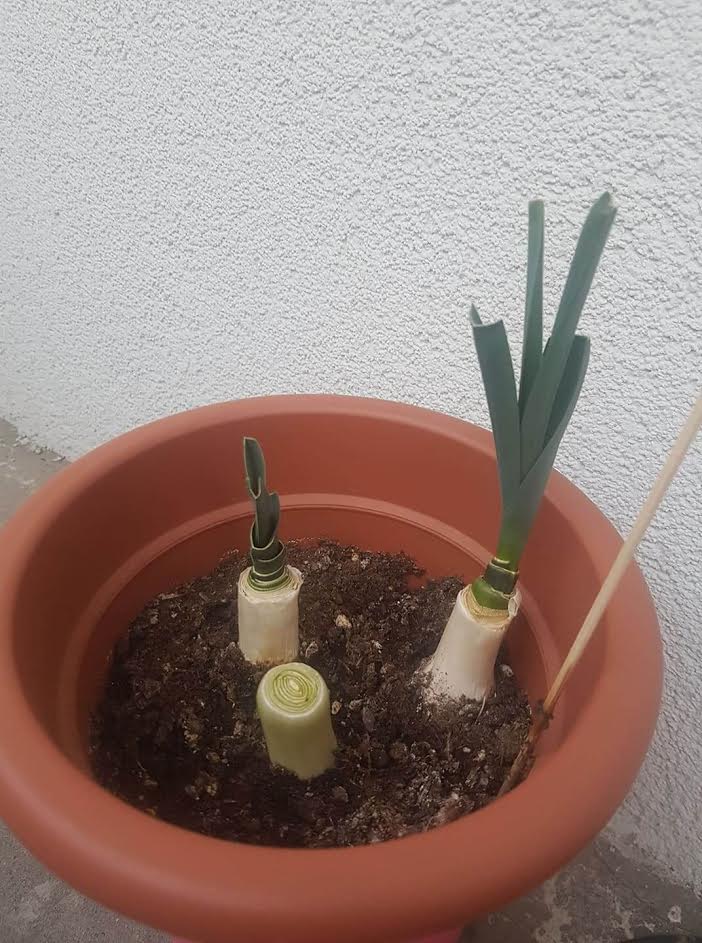
The fruit of boredom: I have planted leeks.
Thanks, Daeun, stay safe and see you on the other side.
TCN is starting a new feature series on foreign experiences of sitting out COVID-19 here in Croatia compared to their home country. If you would like to contribute, the questions are below. Please also include a para about yourself and where you are from, and a link to your website if you would like. Please also send 3-4 photos minimum to This email address is being protected from spambots. You need JavaScript enabled to view it. Subject Corona Foreigner
If you would be interested to record a video version for our partners www.rplus.video please let us know in the email. Thanks and stay safe.
Foreigners Self-Isolating in Croatia: Do You Feel Safer Than in Your Home Country?
Firstly, how are you? Are you alone/with someone? Tell us a little about your situation and sanity levels.
What do you think about the economic measures the government is taking, are they helping your business? (PLEASE IGNORE IF THIS DOES NOT AFFECT YOU)
When did you realise that corona was going to be a big issue?
What is your impression of the way Croatia is dealing with the crisis? How safe do you feel?
Now compare that to your home country and how they are handling it. What is Croatia doing better/worse?
What about official communications from the authorities, compared to your home country?
What's the one thing you wish you had taken with you into self-isolation.
One thing you have learned about yourself, and one thing you have learned about others during this crisis.
TCN has recently become a partner in Robert Tomic Zuber's new R+ video channel, initially telling stories about corona experiences. You can see the first TCN contribution from this morning, my video from Jelsa talking about the realities of running a news portal in the corona era below. If you would like to also submit a video interview, please find Robert's guidelines below
VIDEO RECORDING GUIDE
The video footage should be recorded so that the cell phone is turned horizontally (landscape mode).
There are several rules for television and video news:- length is not a virtue- a picture speaks more than a thousand words
In short, this would mean that your story should not last more than 90 seconds and that everything you say in the report should be shown by video (for example, if you talk about empty streets, we should see those empty streets, etc.).
How to do it with your cell phone? First, use a selfie camera to record yourself telling your story for about a minute and a half. Ideally, it would be taken in the exterior, except in situations where you are reporting on things in the interior (quarantine, hospital, self-isolation, etc.). Also, when shooting, move freely, make sure everything is not static.
After you have recorded your report, you should capture footage that will tell your story with a picture, such as an earlier example with empty streets.
One of the basic rules of TV journalism is that the story is told in the same way as a journalist with his text. Therefore, we ask you for additional effort. Because we work in a very specific situation, sometimes you may not be able to capture footage for each sentence of the report. In this case, record the details on the streets: people walking, the main features of the city where you live, inscriptions on the windows related to the virus, etc.
The same rules apply if you are shooting a story from your apartment, self-isolation, quarantine. We also need you to capture footage that describes your story.
When shooting frames to cover your reports, it is important that you change the angle of the shot (in other words, shoot that empty street from several angles). Also, when shooting a detail, count at least five seconds before removing the camera to another detail.
The material should be about 5 minutes long (90 seconds of your report + frames to cover your story).
After recording everything, send us to Zagreb, preferably via WeTransfer to This email address is being protected from spambots. You need JavaScript enabled to view it.
Croatian Employers on Crisis: State Must Not be Late With Payments
As Poslovni Dnevnik writes on the 6th of April, 2020, a second package of economic measures to help the economy deal with the negative consequences of the coronavirus pandemic showed that the Government had accepted the pleas and requests of Croatian employers, who now have a clearer picture of how to plan their businesses, and their employees are now more confident that they will have their jobs preserved and their income guaranteed.
At this point, with the top priority being that the measures are properly adopted are effectively implemented, it is important for the Croatian Government to remain financially disciplined and to actually stick to strict payment timelines.
“A large number of businesses are working with the central and local government to ensure the smooth delivery of the necessary goods and services even in times of crisis. Wholesale drugstores, pharmacies and contracting healthcare entities are under special pressure due to the epidemic and huge efforts are being made to maintain not only business but also liquidity. Thus, financial discipline is extremely important because the very delay of the state could generate general illiquidity and, in the case of wholesalers, difficulty in the supply of medicine, which is crucial for the health system at the moment,'' said Davor Majetić, CEO of the Croatian Employers' Association (HUP)
Croatian employers will do everything they can to help preserve jobs while retaining the core of our businesses, so that after the crisis, we can launch an economic recovery more quickly and more efficiently.
We will also continue discussions with the government on further measures, first of all, on para-fiscal levies at both the national and local government levels. Non-tax duties and fees are a longstanding thorn in the side of our economy. Now, during the crisis, the payment of as many of these fees as possible should be frozen and an audit should be initiated immediately so that this part is finally and permanently abolished and the other part is significantly reduced,'' a statement from the Croatian Employers' Association said.
Make sure to follow our dedicated section for all you need to know about coronavirus in Croatia.
Krunoslav Capak Discusses Coronavirus Testing, Protocols in Other Countries
As Poslovni Dnevnik writes on the 6th of April, 2020, the director of the Croatian Institute of Public Health, Krunoslav Capak, was interviewed by RTL Today (Danas) and explained in detail who is being tested for coronavirus and by what criteria, because that is one of the most common questions being asked by people up and down the country.
"From the very beginning, we've followed the guidelines of the European Centre for Disease Control and Prevention, as well as the World Health Organisation. It was first said that we needed to test persons who were in contact with a coronavirus positive person or who resided in focal areas and who developed symptoms. Later on, the ECDC changed its instructions and said to test for any serious respiratory disease and then it did so again ten days ago, in saying that we need to test for any acute respiratory disease for which no other cause could be identified,'' Capak told RTL.
An error in assessment may occur, especially when someone is diagnosed over the phone as is being done now, but that is why the coronavirus suspect can always call another doctor or another epidemiologist for a second opinion in each case of suspicion.
Krunoslav Capak also announced that a population-wide study will be done in the Republic of Croatia to see if anyone may have recovered from COVID-19.
"It will definitely work. A few days ago, we launched a literature review to see what that looks like and how it's done in other countries. We know for sure about the Yokoham cruiser, where there were a lot of positive test results, and the percentage of those who didn't even have any symptoms were quite high, but these are special conditions.
No population studies have been launched yet, but we will certainly do it. There are two ways to do this: either take one whole area and inspect people or conduct a so-called sentinel study, where all patients under the care of one general practitioner are studied and a profile is made,'' Krunoslav Capak explained.
For more on coronavirus in Croatia, follow our dedicated section.



